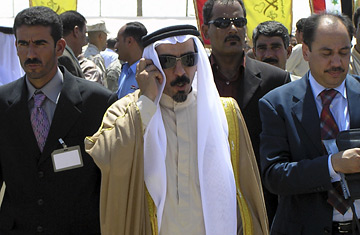
Sheik Abdul-Sattar Abu Risha
Sheik Abdul Sattar Abu Risha was gloomy when I met him at his compound in Ramadi last December. A few days earlier a friend of his had died, U.S. Army Capt. Travis Patriquin, the military's tribal liaison for the area. Patriquin and Sattar had worked closely together late last year, when Sattar first emerged as the leader of a band of tribes around Ramadi coming together to fight al-Qaeda in Iraq. Sattar, like other tribal leaders of Anbar Province, had fallen out with al-Qaeda in Iraq after years of complacency and cooperation with insurgents targeting U.S. forces. The longtime pact between tribal leaders and insurgents in Anbar Province had broken down around Ramadi amid squabbling over money, essentially. When insurgents began raiding highways in Sattar's territory as a means of fundraising, Sittar and his fighters lashed out in defense of their turf. Fighting erupted. By 2006, Sattar found himself in a blood feud with al-Qaeda in Iraq and needed help. He turned first to fellow tribesmen — and then to the Americans.
Patriquin was Sattar's link to the U.S. military presence in his territory. The two got along quite well by all accounts. Sattar had even made Patriquin an honorary member of his own tribe. But a roadside bomb killed Patriquin and two other Americans, just as U.S. military officials and tribal leaders were seeing the beginnings of gains in their nascent partnership against insurgents.
Patriquin's loss was deeply felt on both sides. Sattar himself seemed to be taking it very hard when I was with him. A notorious showboat and media hound, Sattar waved away TIME's photographer at one point, saying he was too depressed to pose for pictures. The sheik vowed to fight on nonetheless. Indeed, he swore revenge. For a time Sattar seemed to be making good on his pledge as tribal fighters loyal to him killed off and drove out insurgents from Ramadi, where al-Qaeda in Iraq had established a headquarters of sorts in the rubble of a city shattered by years of intermittent fighting. As of the summer of 2007, U.S. officials in Baghdad and Washington were publicly claiming Anbar Province had gone from a lost cause to a success model.
President Bush himself went to meet Sattar and his tribal loyalists during his surprise visit to Iraq 10 days ago. Sattar's "Awakening" movement, U.S. leaders hoped, would spread across other parts of Iraq and turn more and more tribes against radical insurgents. Some U.S. officials even suggested that Sattar might lead a political faction in Baghdad as part of a sitting government. Those hopes ended today with news that Sattar was dead. Insurgents killed the sheik the same way they did his American friend, with a roadside bomb near his compound that left two of Sattar's bodyguards dead as well.
Within hours of his death, tribal figures who surrounded Sattar were promising to continue on as he had with their fight against insurgents in Anbar Province. But anyone who knows the dynamics of Middle East tribalism understands that Sattar's death represents a huge blow to the U.S. strategy in Anbar Province and greatly dims hopes for success elsewhere in Iraq. Wily and charismatic, Sattar in essence embodied the U.S. strategy for Anbar Province and stood as a kind of unlikely poster boy (banditry was part of his tribe's expertise) for the Administration's hopes for a turnaround in Iraq. If there were only a Sattar or two for every province, the thinking went, then the insurgency might finally fade enough to allow the government in Baghdad to function properly. Never mind that the Shi'ite sectarian partisans of the Iraqi government in Baghdad led by Iraqi Prime Minister Nouri al-Maliki seemed altogether unwilling to include such Sunni local leaders in the political process. Grassroots success would reshape the political landscape and allow things to work out,or so the Americans hoped. And so U.S. military leaders sought more tribal chieftains in other provinces, and continue to do so even now. The sheik may have been an unsavory character but to paraphrase what Franklin Roosevelt once said of a Central American dictator, "He may be an S.O.B., but he's our S.O.B."
But it turns out there was only one Sattar. Any such would-be sheiks have a way of getting killed long before their names every make the news. Time and again sheiks whom U.S. military officials reach out to wind up dead. Sattar's knack for surviving repeated assassination attempts made him all the more important to American leaders. It's difficult to imagine anyone who can replace him in Ramadi, and no one like him has come on the scene elsewhere in Iraq.
Whether or not the tribes who followed Sattar will remain working with the U.S. military in the wake of his death remains unclear. Sattar's brother, Ahmed Abu Risha, is poised to take over leadership of Sattar's movement. But his ability to hold tribal factions together is uncertain, and military officials may have to win loyalties all over again.
In the months ahead, violence in Anbar Province will likely rise again as Sattar's successor faces further death threats while commanding less of a following. And the biggest U.S. success to date in Iraq will likely unravel slowly.
